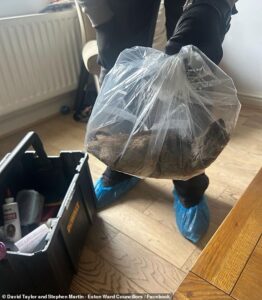- Have YOU got a story? Email tips@dailymail.co.uk
By LAURA FOX
Published: | Updated:
Jessie J has revealed she’s been rushed to hospital with fluid on her lungs, six weeks after undergoing surgery for breast cancer.
The singer, 37, has been recovering following the operation in June, after revealing the cancer had luckily been caught by doctors ‘early’.
But taking to Instagram Stories on Sunday, Jessie revealed that she had been readmitted to hospital, and has since been told she has an infection.
Sharing a photo from her hospital bed, Jessie shared a snap of an IV canula in her hand, and admitted she’s found the recovery from her surgery the ‘most mentally challenging time.’
In the post, she wrote: ‘How I spent the last 24 hours. 6 weeks post surgery and I was back in the same ward I was after my surgery. Not expected or planned.’
She went onto reveal: ‘I had and still have symptoms that pointed towards a blood clot on the lung. IT IS NOT A BLOOD CLOT THANK GOD.
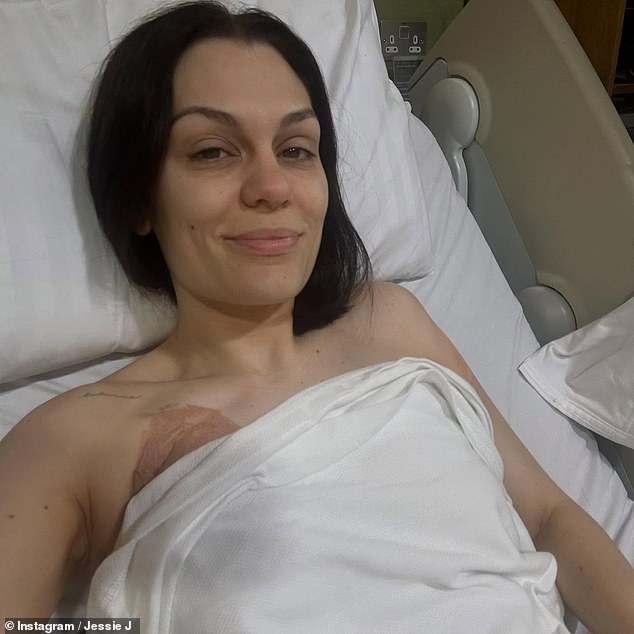
‘They ran a lot tests, which ended up showing I have an infection (still trying to figure out what) and a little fluid on my lungs.
‘Finding it hard to breathe in, but I discharged myself last night (I hate being in hospital) and will continue the investigation as an outpatient.’
In a second post, Jessie wrote: ‘I know many people who will have gone through this or similar may or may not agree with me on this or not, and that’s OK.
‘But I know for me, the true hard journey of this whole thing physically was the day I went into surgery. The recovering physically is far from quick or easy, and mentally it’s been the most challenging time for me.
‘Especially as a Mum with a toddler and being unable to be the mother I usually am.
‘And having to change the plans for my career for this year has been frustrating after working so hard to get to the point and excited to do it all. But it’s life. I know that.
‘And don’t get me wrong, getting the all clear was an is incredible, but that result didn’t speed up or make the recovery from the surgery any easier physically.’
In her final post, Jessie told her followers that the health scare has been a stark reminder that she still needs to ‘slow down’ while she continues her recovery from surgery.
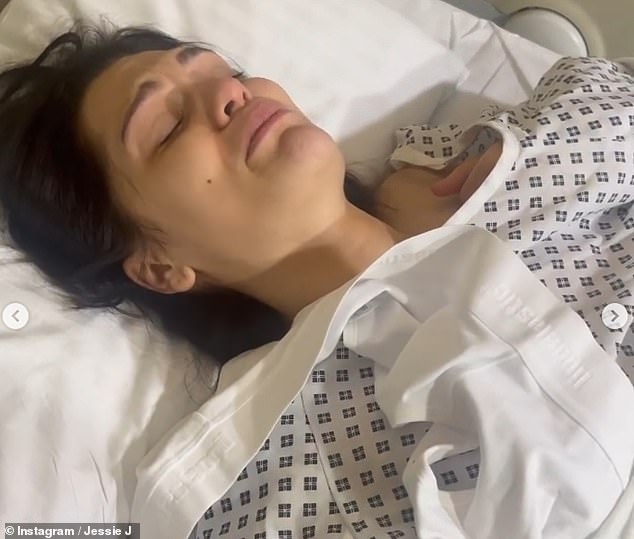
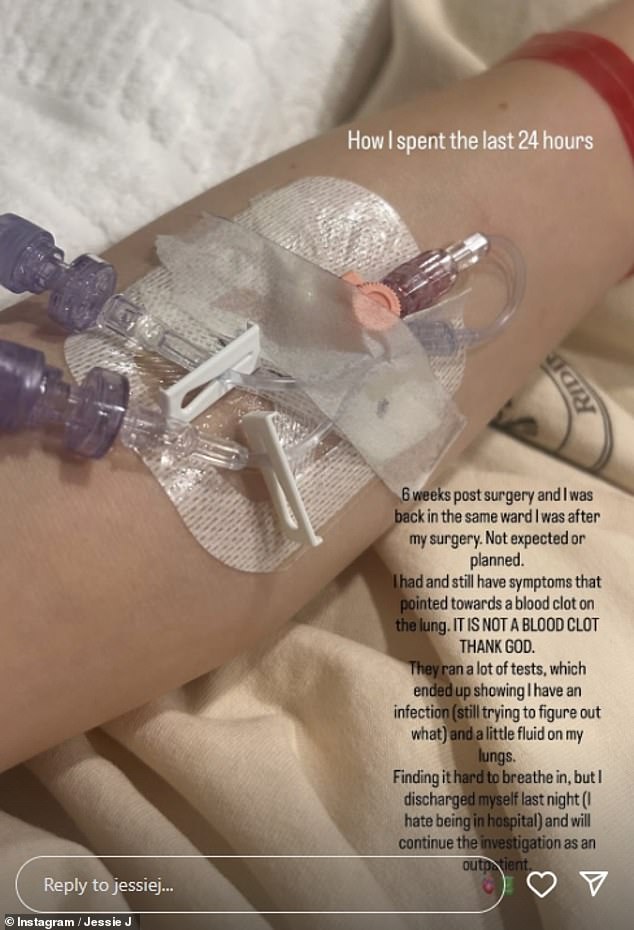
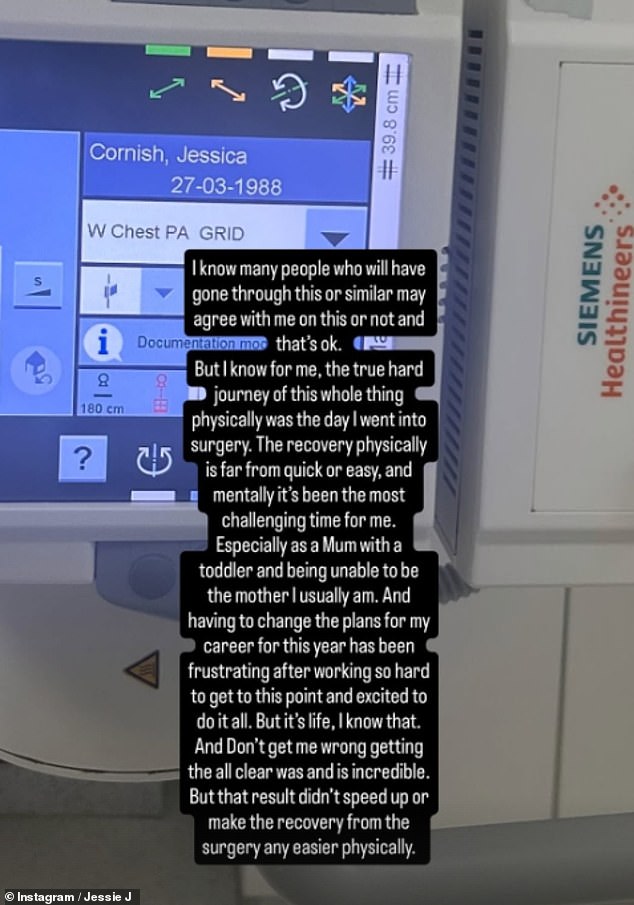
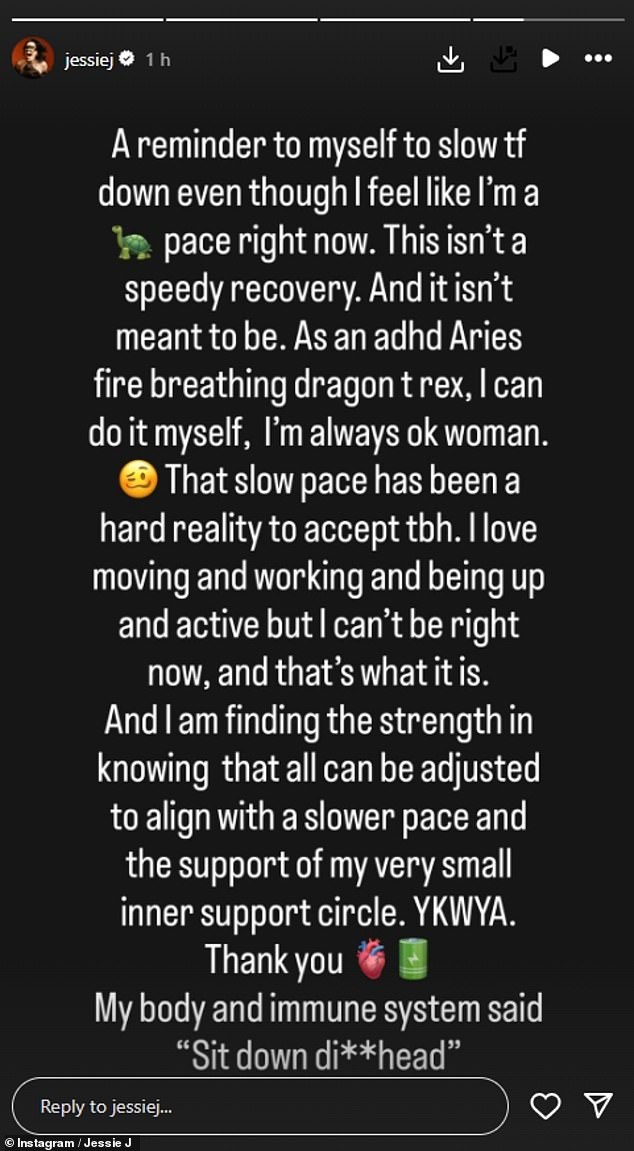
She added: ‘A reminder to myself to slow tf down even though I feel like I’m at a [turtle] pace right now.
‘This isn’t a speedy recovery. And it isn’t meant to be. As an ADHD Ariest fire breathing dragon T-Rex, I can do it myself, I’m always OK woman.
‘That slow pace has been a hard reality to accept tbh. I love moving and working and being up and active but I can’t be right now, and that’s what it is.
‘And I am finding the strength in knowing that all can be adjusted to align with a slower pace and the support of my very small inner support circle YKWYA. Thank you.
‘My body and immune system said ”sit down d***head”.’
Jessie previously admitted she went into ‘survival mode’ upon learning of her cancer diagnosis, but is now letting herself feel angry and sad in equal measure.
Sharing an Instagram post in June, she wrote: Jessie wrote: ‘2 weeks post surgery. Had my drain out 2 nights ago. She said breathe in and take a hard breathe out. She whipped that thang out so quick. Woii oii. Weirdest feeling. But so nice to have it out after 12 days.
‘Now it’s just me and my wonky boobs trying to figure out how to dress until I match them up. The left one is looking at me like ‘you ok babe?”.
She continued: ‘Also my experience was when I was diagnosed I went into survival mode.
‘There was so much going on with appointments and in my mind esp with a toddler I had just moved and was about to start this campaign after 8 years away. Mad.
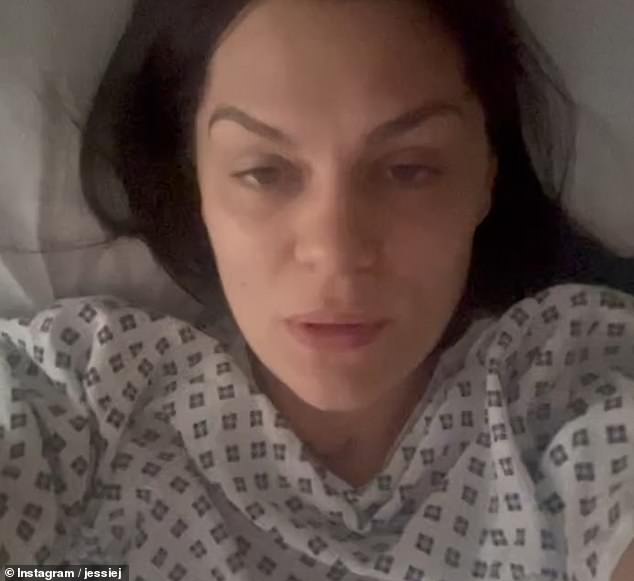
‘I didn’t really have a lot of time to process what was happening or what was going to happen. So I’m currently experiencing some delayed sadness and frustration by having time to process what IS happening.
‘A little disappointed in myself I didn’t say goodbye to my old boob enough. Sounds silly but that’s where I’m at. Again that’s my journey. I’m sure others feel different.
‘But for me I didn’t think beyond the surgery. I was just being strong. Well now I’m here and letting myself be angry and sad and all the things. Just for a few days.
‘Then I will sew some padding in a bra to even them out order some t-shirts and crack tf on’.
Jessie previously confirmed that she is not cancer free, a day after posting her hopes to be rid of the disease.
The singer said last month her previous post had been ‘misunderstood’ and while she was ‘praying’ for good news, the cancer at present had unfortunately not ‘all gone’.
Breast cancer is one of the most common cancers in the world and affects more than two MILLION women a year
Breast cancer is one of the most common cancers in the world. Each year in the UK there are more than 55,000 new cases, and the disease claims the lives of 11,500 women. In the US, it strikes 266,000 each year and kills 40,000. But what causes it and how can it be treated?
What is breast cancer?
It comes from a cancerous cell which develops in the lining of a duct or lobule in one of the breasts.
When the breast cancer has spread into surrounding tissue it is called ‘invasive’. Some people are diagnosed with ‘carcinoma in situ’, where no cancer cells have grown beyond the duct or lobule.
Most cases develop in those over the age of 50 but younger women are sometimes affected. Breast cancer can develop in men, though this is rare.
Staging indicates how big the cancer is and whether it has spread. Stage 1 is the earliest stage and stage 4 means the cancer has spread to another part of the body.
The cancerous cells are graded from low, which means a slow growth, to high, which is fast-growing. High-grade cancers are more likely to come back after they have first been treated.
What causes breast cancer?
A cancerous tumour starts from one abnormal cell. The exact reason why a cell becomes cancerous is unclear. It is thought that something damages or alters certain genes in the cell. This makes the cell abnormal and multiply ‘out of control’.
Although breast cancer can develop for no apparent reason, there are some risk factors that can increase the chance, such as genetics.
What are the symptoms of breast cancer?
The usual first symptom is a painless lump in the breast, although most are not cancerous and are fluid filled cysts, which are benign.
The first place that breast cancer usually spreads to is the lymph nodes in the armpit. If this occurs you will develop a swelling or lump in an armpit.
How is breast cancer diagnosed?
- Initial assessment: A doctor examines the breasts and armpits. They may do tests such as a mammography, a special x-ray of the breast tissue which can indicate the possibility of tumours.
- Biopsy: A biopsy is when a small sample of tissue is removed from a part of the body. The sample is then examined under a microscope to look for abnormal cells. The sample can confirm or rule out cancer.
If you are confirmed to have breast cancer, further tests may be needed to assess if it has spread. For example, blood tests, an ultrasound scan of the liver or a chest X-ray.

How is breast cancer treated?
Treatment options which may be considered include surgery, chemotherapy, radiotherapy and hormone treatment. Often a combination of two or more of these treatments are used.
- Surgery: Breast-conserving surgery or the removal of the affected breast depending on the size of the tumour.
- Radiotherapy: A treatment which uses high energy beams of radiation focused on cancerous tissue. This kills cancer cells, or stops them from multiplying. It is mainly used in addition to surgery.
- Chemotherapy: A treatment of cancer by using anti-cancer drugs which kill cancer cells, or stop them from multiplying.
- Hormone treatments: Some types of breast cancer are affected by the ‘female’ hormone oestrogen, which can stimulate the cancer cells to divide and multiply. Treatments which reduce the level of these hormones, or prevent them from working, are commonly used in people with breast cancer.
How successful is treatment?
The outlook is best in those who are diagnosed when the cancer is still small, and has not spread. Surgical removal of a tumour in an early stage may then give a good chance of cure.
The routine mammography offered to women between the ages of 50 and 71 means more breast cancers are being diagnosed and treated at an early stage.
For more information visit breastcancernow.org or call its free helpline on 0808 800 6000



